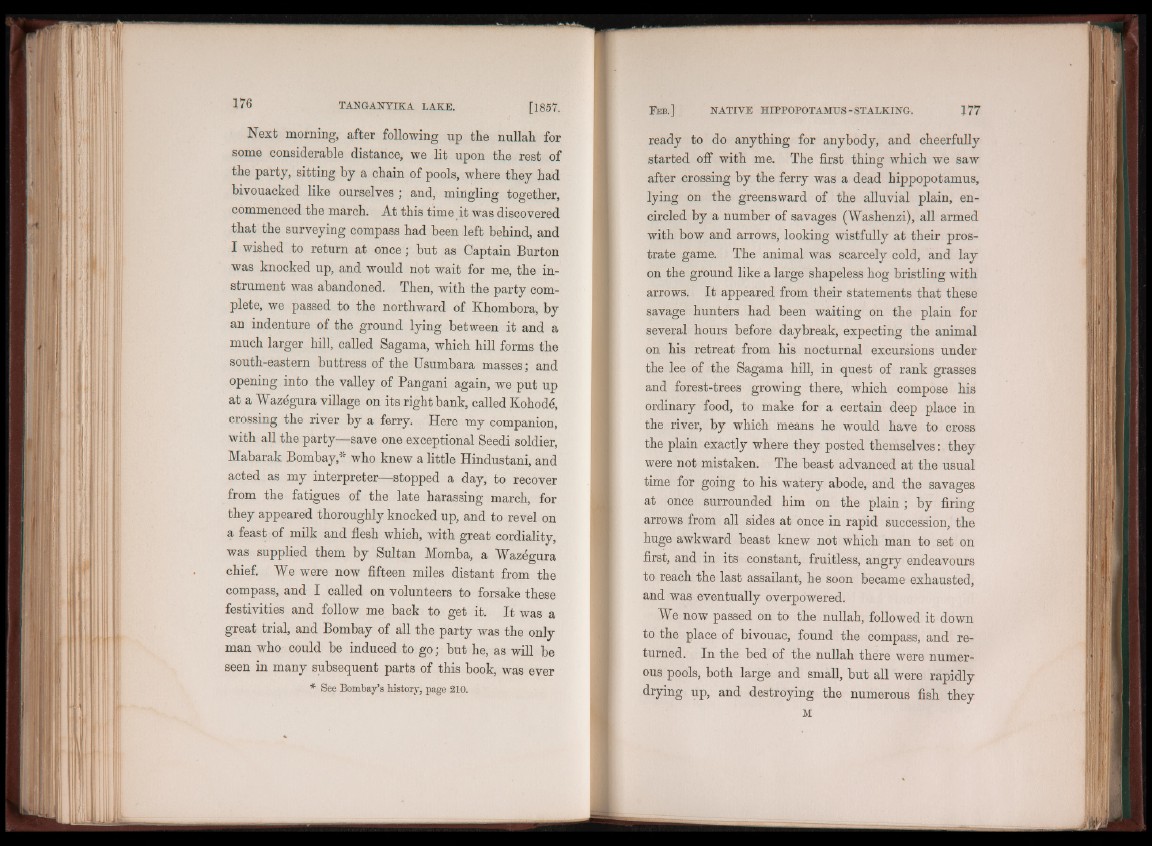
Next morning, after following up the nullah, for
some considerable distance, we lit upon the rest of
the party, sitting by a chain of pools, where they had
bivouacked like ourselves ; and, mingling together,
commenced the march. At this time it was discovered
that the surveying compass had been left behind, and
I wished to return at once; but as Captain Burton
was knocked up, and would not wait for me, the instrument
was abandoned. Then, with the party complete,
we passed to the northward of Khombora, by
an indenture of the ground lying between it and a
much larger hill, called Sagama, which hill forms the
south-eastern buttress of the Usumbara masses; and
opening into the valley of Pangani again, we put up
at a Wazdgura village on its right bank, called Kohod6,
crossing the river by a ferry. Here my companion,
with all the party—save one exceptional Seedi soldier,
Mabarak Bombay,* who knew a little Hindustani, and
acted as my interpreter—stopped a day, to recover
from the fatigues of the late harassing march, for
they appeared thoroughly knocked up, and to revel on
a feast of milk and flesh which, with great cordiality,
was supplied them by Sultan Momba, a Waz^gura
chief. We were now fifteen miles distant from the
compass, and I called on volunteers to forsake these
festivities and follow me back to get it. I t was a
great trial, and Bombay of all the party was the only
man who could be induced to go; but he, as will be
seen in many subsequent parts of this book, was ever
* See Bombay’s history, page 210.
ready to do anything for anybody, and cheerfully
started off with me. The first thing which we saw
after crossing by the ferry was a dead hippopotamus,
lying on the greensward of the alluvial plain, encircled
by a number of savages (Washenzi), all armed
with bow and arrows, looking wistfully at their prostrate
game. The animal was scarcely cold, and lay
on the ground like a large shapeless hog bristling with
arrows. I t appeared from their statements that these
savage hunters had been waiting on the plain for
several hours before daybreak, expecting the animal
on his retreat from his nocturnal excursions under
the lee of the Sagama hill, in quest of rank grasses
and forest-trees growing there, which compose his
ordinary food, to make for a certain deep place in
the river, by which means he would have to cross
the plain exactly where they posted themselves: they
were not mistaken. The beast advanced at the usual
time for going to his watery abode, and the savages
at once surrounded him on the plain ; by firing
arrows from all sides at once in rapid succession, the
huge awkward beast knew not which man to set on
first, and in its constant, fruitless, angry endeavours
to reach the last assailant, he soon became exhausted,
and was eventually overpowered.
We now passed on to the nullah, followed it down
to the place of bivouac, found the compass, and returned.
In the bed of the nullah there were numerous
pools, both large and small, but all were rapidly
drying up, and destroying the numerous fish they
M